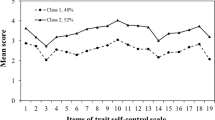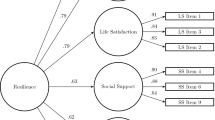Abstract
Prior research has shown that trait resilience is linked with subjective well-being, however, less is revealed about the longitudinal relationship between trait resilience and subjective well-being in emerging adulthood. This study used a two-wave cross-lagged design ((N = 563 for Time 1; N = 509 for Time 2) to explore the relationship between these two variables in emerging adults. The cross-lagged path analysis found that trait resilience predicted the three components of subjective well-being (i.e., life satisfaction, positive affect and negative affect) over five months. Additionally, positive affect but not life satisfaction and negative affect predicted trait resilience over five months. The present study provides further evidence for the longitudinal relationship between trait resilience and subjective well-being in Chinese emerging adults. Limitations and future directions of the research were discussed.

Similar content being viewed by others
Data Availability
The data that support the findings of this study are available from the corresponding author upon reasonable request.
References
Anthony, N. M. (2002). Resilience: A many-splendored construct? American Journal of Orthopsychiatry, 72(4), 596–599.
Arnett, J. J. (2004). Emerging adulthood: the winding road from the late teens through the twenties. American Journal of Psychology, 32(2), 378–379.
Bai, X., Wu, C., Zheng, R., & Ren, X. (2011). The psychometric evaluation of the Satisfaction with Life Scale using a nationally representative sample of China. Journal of Happiness Studies, 12(2), 183–197.
Bajaj, B., & Pande, N. (2016). Mediating role of resilience in the impact of mindfulness on life satisfaction and affect as indices of subjective well-being. Personality & Individual Differences, 93(4), 63–67.
Block, J., & Kremen, A. M. (1996). IQ and ego-resiliency: Conceptual and empirical connections and separateness. Journal of Personality and Social Psychology, 70(2), 349–361.
Bonanno, G. A. (2004). Loss, trauma, and human resilience: Have We Underestimated the Human Capacity to Thrive After Extremely Aversive Events? American Psychologist, 59(1), 20–28.
Campbell-Sills, L., & Stein, M. B. (2007). Psychometric analysis and refinement of the CD-RISC. Journal of Traumatic Stress, 20(6), 1019–1028.
Campbell-Sills, L., Cohan, S. L., & Stein, M. B. (2006). Relationship of resilience to personality, coping, and psychiatric symptoms in young adults. Behaviour Research and Therapy, 44(4), 585–599.
Connor, K. M., & Davidson, J. R. T. (2003). Development of a new resilience scale: The ConnorDavidson Resilience Scale (CD-RISC). Depression and Anxiety, 18, 76–82.
Di Fabio, A., & Palazzeschi, L. (2015). Hedonic and eudaimonic well-being: the role of resilience beyond fluid intelligence and personality traits. Frontiers in Psychology, 6, 1367.
Diener, E., Emmons, R. A., Larsen, R. J., & Grin, S. (1985). The satisfaction with life scale. Journal of Personality Assessment, 49(1), 71–75.
Diener, E., Heintzelman, S. J., Kushlev, K., Tay, L., Wirtz, D., Lutes, L. D., & Oishi, S. (2017). Findings all psychologists should know from the new science on subjective well-being. Canadian Psychology, 58(2), 87–104.
Diener, E., Wirtz, D., Tov, W., Kim-Prieto, C., Choi, D. W., Oishi, S., & Biswas-Diener, R. (2010). New well-being measures: Short scales to assess flourishing and positive and negative feelings. Social Indicators Research, 97(2), 143–156.
Fredrickson, B. L., Cohn, M. A., Coffey, K. A., Pek, J., & Finkel, S. M. (2008). Open hearts build lives: positive emotions, induced through loving-kindness meditation, build consequential personal resources. Journal of Personality and Social Psychology, 95(5), 1045–1062.
Fredrickson, B. L. (2004). The role of positive emotions in positive psychology. the broaden-and-build theory of positive emotions. American Psychologist, 359(1449), 1367–1377.
Fredrickson, B. L. (2013). Positive emotions broaden and build. Advances in Experimental Social Psychology, 47, 1–53.
Galambos, N. L., Barker, E. T., & Krahn, H. J. (2006). Depression, self-esteem, and anger in emerging adulthood: seven-year trajectories. Developmental Psychology, 42(2), 350.
Harpøth, T., Kongerslev, M. T., Trull, T. J., Johanna, H., Bateman, A. W., & Erik, S. (2020). Associations of positive and negative emotions with ego-resiliency and quality of life in borderline personality disorder: a daily diary study. Personality Disorders, 11(1), 13–23.
Hartley, M. T. (2012). Assessing and promoting resilience: An additional tool to address the increasing number of college students with psychological problems. Journal of College Counseling, 15(1), 37–51.
Hu, L. T., & Bentler, P. M. (1999). Cutoff criteria for fit indexes in covariance structure analysis: Conventional criteria versus new alternatives. Structural equation modeling: a multidisciplinary journal, 6(1), 1–55.
Hu, T., Zhang, D., & Wang, J. (2015). A meta-analysis of the trait resilience and mental health. Personality and Individual Differences, 76, 18–27.
Jayawickreme, E. F., Seligman, M., & Martin, E. P. (2012). The engine of well-being. Review of General Psychology, 16(4), 327–342.
Tomás, J. M., Sancho, P., Melendez, J. C., & Mayordomo, T. (2012). Aging & Mental Health Resilience and coping as predictors of general well- being in the elderly: A structural equation modeling approach. Aging & Mental Health, 16(3), 317–326.
Klohnen, E. C., Vandewater, E. A., & Young, A. (1996). Negotiating the middle years: ego-resiliency and successful midlife adjustment in women. Psychological Aging, 11(3), 431–442.
Kong, F., & You, X. (2013). Loneliness and self-esteem as mediators between social support and life satisfaction in late adolescence. Social Indicators Research, 110(1), 271–279.
Kong, F., Ding, K., & Zhao, J. (2015a). The relationships among gratitude, self-esteem, social support and life satisfaction among undergraduate students. Journal of Happiness Studies, 16(2), 477–489.
Kong, F., Gong, X., Sajjad, S., Yang, K., & Zhao, J. (2019). How is emotional intelligence linked to life satisfaction? The mediating role of social support, positive affect and negative affect. Journal of Happiness Studies, 20(8), 2733–2745.
Kong, F., Wang, X., Hu, S., & Liu, J. (2015b). Neural correlates of psychological resilience and their relation to life satisfaction in a sample of healthy young adults. Neuroimage, 123(4), 165–172.
Kong, F., Yang, K., Yan, W., & Li, X. (2020). How does trait gratitude relate to subjective well-being in Chinese adolescents? the mediating role of resilience and social support. Journal of Happiness Studies, 22, 1611–1622.
Kong, F., Ma, X., You, X., & Xiang, Y. (2018). The resilient brain: psychological resilience mediates the effect of amplitude of low-frequency fluctuations in orbitofrontal cortex on subjective well-being in young healthy adults. Social Cognitive and Affective Neuroscience, 13(7), 755–763.
Kuldas, S., & Foody, M. (2021). Neither resiliency-trait nor resilience-state: Transactional Resiliency/e.Youth & Society, 0044118X211029309
Li, F., Bai, X., & Wang, Y. (2013). The Scale of Positive and Negative Experience (SPANE): Psychometric properties and normative data in a large Chinese sample. PloS One, 8(4), 1–9.
Liu, Y., Wang, Z., Zhou, C., & Li, T. (2014). Affect and self-esteem as mediators between trait resilience and psychological adjustment. Personality and Individual Differences, 66, 92–97.
Mak, W. W. S., Ng, I. S. W., & Wong, C. C. Y. (2011). Resilience: Enhancing well-being through the positive cognitive triad. Journal of Counseling Psychology, 58(4), 610–617.
Mayordomo, T., Viguer, P., Sales, A., Satorres, E., & JC Meléndez. (2016). Resilience and coping as predictors of well-being in adults. Journal of Psychology, 150(7), 809–821.
Messersmith, E. E., & Schulenberg, J. E. (2010). Goal attainment, goal striving, and well-being during the transition to adulthood: A ten-year US national longitudinal study. New Directions for Child and Adolescent Development, 2010(130), 27–40.
Mota, C., & Matos, P. (2015). Adolescents in institutional care: Significant adults, resilience and well-being. Child and Youth Care Forum, 44(2), 209–224.
Murphy, L. K., Bettis, A. H., Gruhn, M. A., Gerhardt, C. A., Vannatta, K., & Compas, B. E. (2017). Resilience in adolescents with cancer: Association of Coping with Positive and Negative Affect. Journal of Developmental and Behavioral Pediatrics, 38(8), 646–653.
Ong, A. D., Bergeman, C. S., Bisconti, T. L., & Wallace, K. A. (2006). Psychological resilience, positive emotions, and successful adaptation to stress in later life. Journal of Personality and Social Psychology, 91(4), 730–749.
Pettit, J. W., Roberts, R. E., Lewinsohn, P. M., Seeley, J. R., & Yaroslavsky, I. (2011). Developmental relations between perceived social support and depressive symptoms through emerging adulthood: blood is thicker than water. Journal of Family Psychology, 25(1), 127.
Pretsch, J., Flunger, B., & Schmitt, M. (2012). Resilience predicts well-being in teachers, but not in non-teaching employees. Social Psychology of Education, 15(3), 321–336.
Satici, & Ahmet, S. (2016). Psychological vulnerability, resilience, and subjective well-being: the mediating role of hope. Personality and Individual Differences, 102, 68–73.
Schulenberg, J. E., Sameroff, A. J., & Cicchetti, D. (2004). The transition to adulthood as a critical juncture in the course of psychopathology and mental health. Development and Psychopathology, 16(4), 799–806.
Skodol, A. E. (2010). The resilient personality. In J. W. Reich, A. J. Zautra, & J. S. Hall (Eds.), Handbook of adult resilience (pp. 112–125). New York: Guilford Press.
Tong, K. K., & Wang, Y. Y. (2017). Validation of the flourishing scale and scale of positive and negative experience in a Chinese community sample.PloS One, 12(8), e0181616
Wang, L., Shi, Z., Zhang, Y., & Zhang, Z. (2010). Psychometric properties of the 10-item Connor-Davidson Resilience Scale in Chinese earthquake victims. Psychiatry and Clinical Neurosciences, 64(5), 499–504.
Wang, Y., Huang, Z., Huang, L., & Kong, F. (2020). Parenting stress and life satisfaction in mothers of children with cerebral palsy: the mediating effect of social support. Journal of Health Psychology, 25, 416–425.
Yu, X., & Zhang, J. (2007). Factor analysis and psychometric evaluation of the CD-RISC with Chinese people. Social Behavior and Personality, 35(1), 19–30.
Zheng, W., Huang, Y., & Fu, Y. (2020). Mediating effects of psychological resilience on life satisfaction among older adults: a cross-sectional study in china. Health & Social Care in the Community, 28(4), 1323–1332.
Acknowledgements
This work was supported by the Social Science Foundation of Shaanxi Province (2022F094), the Natural Science Foundation of Shaanxi Province (2022JQ-155), and the Fundamental Research Funds for the Central Universities (GK202103131).
Author information
Authors and Affiliations
Corresponding author
Ethics declarations
Disclosures
The authors declare that they have no conflict of interest.
Inform Consent
Inform consent was obtained from all participants to fill out the questionnaires.
Additional information
Publisher’s Note
Springer Nature remains neutral with regard to jurisdictional claims in published maps and institutional affiliations.
Rights and permissions
Springer Nature or its licensor holds exclusive rights to this article under a publishing agreement with the author(s) or other rightsholder(s); author self-archiving of the accepted manuscript version of this article is solely governed by the terms of such publishing agreement and applicable law.
About this article
Cite this article
Fan, D., Li, C., Zhu, N. et al. Trait resilience and subjective well-being in emerging adulthood: a two-wave longitudinal study. Curr Psychol 42, 26200–26206 (2023). https://doi.org/10.1007/s12144-022-03727-2
Accepted:
Published:
Issue Date:
DOI: https://doi.org/10.1007/s12144-022-03727-2




